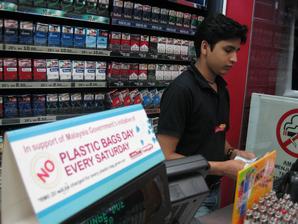By Steve Toloken
STAFF REPORTER / ASIA BUREAU CHIEF
Published: September 27, 2013 3:21 pm ET
Updated: September 27, 2013 3:48 pm ET

Image By: Steve Toloken, Plastics News
A grocery store has a 'no plastic bags day' on Saturdays.
TAIZHOU, CHINA — Some of Asia's national plastics associations believe they're starting to turn the tide in their battles against bag bans and other restrictions on plastic packaging. They're crediting advertising campaigns and grassroots outreach with playing a big role.
Speaking at a late September conference on environmental issues facing Asia's plastics industry, association leaders from several countries said they believe attitudes are changing among governments that previously sought to put tight restrictions on plastic packaging, such as the Philippines and Malaysia.
Still, plastics-specific bans continue to pick up steam in some places, driven by government struggles to fund waste management systems, according to association leaders at the Asia Plastics Forum, held Sept. 25-26 in Taizhou, China.
Officials with the PlastIndia Foundation, for example, said that governments "in one state after another" there are banning bags and said the situation represented "big alarm bells for us."
Similarly, one plastics association leader warned that unless more is done to address severe waste and litter problems, industry could find it difficult to get public support for other priorities.
"The commercial aspects and the strength of the industry are not being considered with an open mind mainly because of the failures to manage post-use plastic waste," said Jashim Uddin, president of the Dhaka-based Bangladesh Plastic Goods Manufacturers & Exporters Association. "Policy makers [have] always maintained a negative attitude toward the plastic industries."
In some places, though, industry officials said they felt they were gaining ground. The Philippines Plastics Industry Association said that while pressure remains on the industry, talks with governments and others are paying off, as they argue that littering, not plastics, should be targeted.
"There are some cities in metro Manila that are reviewing their ordinances on banning plastics and some cities are saying they will not ban," said Peter Qiuntana, president of the Philippine Plastics Industry Association Inc.
"This is the work we've been doing for the last four years," he said. "We've been working with the communities, with the churches. We have been working really hard with NGOs… Some NGOs that previously were in favor of banning plastics now do not want to ban plastics."
Six of the 17 cities in the Manila metro area have a total ban on plastic bags in many stores, favoring paper or reusable bags, while another five have less severe restrictions, he said.
In an interview after his speech, Quintana said the bag bans began after severe flooding in Manila in 2008 was blamed on plastic bags and other debris clogging drains.
But when severe floods happened this year, including in cities that had banned bags, he said the public and media began to question what the bans had accomplished: "People are asking, 'If we still have floods, why are we banning plastic?'"
As well, officials with the Malaysian Plastics Manufacturers Association said their outreach, including media and public relations campaigns begun in 2012, has helped.
MPMA began with an anti-littering campaign, and this year broadened it to include education efforts about the 3Rs — reuse, reduce and recycle — and how plastics can help with environmental sustainability, like making cars lighter and more fuel efficient or reducing energy consumption with home insulation.
"The main objective is to overcome this negative perception of plastics in Malaysia," said Y.A. Liew, an MPMA spokesman and managing director of injection molder Polyparts Sdn. Bhd. "We are pleased to inform that we have gotten some results, especially in influencing the authorities, so hopefully they will change their mindset."
MPMA officials consider it a success that most of the country has not followed in the footsteps of the state of Penang, which banned free plastic bags.
They're now working with Penang's government to put a program in more than 100 schools talking about plastic and the 3Rs. While that may sound modest, MPMA officials said it signals a shift in attitude and opens the way for dialogue.
"Penang was very anti-plastics initially and we wanted to have dialogue with them but we could not make the arrangements," said C.Y. Chow, chief executive of Combi-Pack Sdn Bhd. and a member of MPMA's executive committee. "Now the state is actually discussing with MPMA providing literature and discussing the proper management of plastic waste."
Still, he told the delegates that the MPMA needs to keep up that work, which was funded by a special levy on member companies.
"It is obvious that we have to continue the media and PR campaign as the public misconception towards plastics is still rife — therefore more needs to be done," Chow said.
The debate about bags and the environment is not at present a major economic hurdle for the industry, since bags are only a tiny fraction of polymer use, and industry officials said all the attention hasn't seemed to dent overall growth.
For example, India's market for virgin plastics is projected to grow from 11 million metric tons now to 20 million metric tons by 2020, said LK Singh, a vice president of PlastIndia Foundation and managing director of rotomolding equipment maker Fixopan Machines Pvt. Ltd.
Bags are less than 1 percent of that, he said, but all the media attention tars the image of plastics as a whole, so PlastIndia Foundation officials feel they must address it. The group funded a pilot waste collection program for 2,500 homes in Mumbai, and would like to do it in more places next year, he said.
Even while bans are on the rise, Singh said that industry groups feel they are making progress, suggesting how fluid the debate can be. The group praised an Indian Supreme Court ruling earlier this year on waste management, for example.
"The authorities are listening," Singh said. "They are saying that plastic should be put in perspective." | 